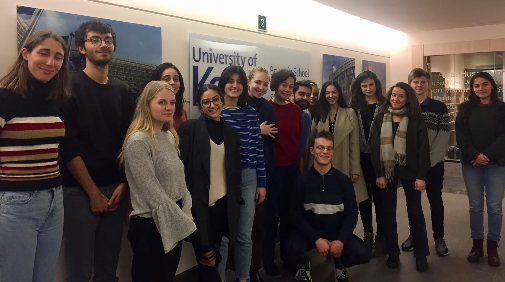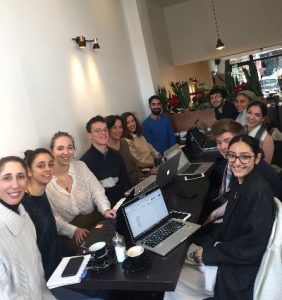Last Tuesday Zana Hanafi came to class to share her story of the treacherous journey she and her family faced to seek refuge in the EU.
Zana was only sixteen-year-old when ISIS arrived in Kobanî, her hometown, in northern Syria. As a result, she and her family along with their fellow citizens fled from their home town towards Turkey within a short space of time, leaving the turkish border authority with no other option than suspend border control. In this way, the Hanafis managed to enter Turkey. However, due to their Kurdish origin, they soon felt unsafe there and decided to seek asylum in Norway, due to its lower asylum seeker numbers. When Zana heard that her father’s intention was to go to Europe, she told us that as a teenager: “I was so happy… it was my dream…. I was super excited!”.
They paid a smuggler to reach their destination. Zana and her family traveled for three days in the back of a truck and to their despair, they were left in the middle of the night at the Hungarian borders, not in Norway.
Once in the country, the police arrested them and immediately transferred the whole family to a detention centre. In the camp, the conditions were inhumane due to poor hygiene and sanitation, bad quality food and unsanitary water, and critical exposure to cold. For instance, the water provided came from the toilet. The Hanafis – as all the other detainees – were repetitively subjected to degrading treatment by the guards. Zana was forced to provide her fingerprints without being informed that this was a legal obligation.
While the family was in the camp, they, along with other residents, were forced to take sleeping pills. Officials would barge into their rooms multiple times at night to check if they were asleep. One time, while Zana was showering past curfew, three officials stormed in, although Zana’s father clearly informed them she was still there.
The family was also kept in the dark about their legal status since they were not allowed to consult a lawyer.
After a while, the Hanafis were permitted to leave the camp and they managed to reach Norway. There, they were again placed in a centre awaiting their unknown fate. Just as they had settled in, they were sent back to Hungary via the Dublin mechanism, although Norwegian authorities were clearly informed Hungary was unwilling to welcome the family. When Zana protested the deportation, she was handcuffed by Norwegian police officers and forced to board a plane with her family. When she told us about the degrading treatment she was submitted to by the police officers she said ‘“I am not a killer! (…) being an asylum seeker is not a crime!”. Zana stated she was still wearing her pajamas when they arrived in Hungary again. After sleeping for three nights in the streets of Budapest, the Hanafi family managed to contact some relatives living in Austria and decided to go there to seek asylum.
Upon arrival, the Hanafis were detained for 24 hours. Following their release, they applied for international protection. Two months later, they were informed that Hungary was responsible to examine their application and therefore they had to be transferred back to that Member State. They lodged an appeal against that decision before the High Court which was eventually rejected. Two months later, the police barged into their accomodation at 5 am to escort them to the train leading back to Hungary.
Once there, Zana, to her astonishment, found out that she and her family were granted subsidiary protection since their first entry into Hungary. She then realised that the trauma and odyssey they had to go though was for nothing, because they had legal protection all along.
With the help of an N.G.O., the Hanafis managed to secure temporary accommodation. Zana had to take two jobs to make ends meet. In the morning, she worked with refugee children to help them adjust to their new environment and in the evening, she was a chef’s assistant at a Lebanese restaurant. Her younger siblings were enrolled in school.
When things started gaining a semblance of normality, the Hanafi’s life took yet another unfortunate turn when Viktor Orbán and the Fidesz party started a massive anti-refugees campaign. This later translated into national rules in utter contradiction with basic human rights and EU law. Zana lost her job after Orbán criminalised NGOs helping asylum seekers with their applications.
This radical shift within politics was also reflected in the Hungarian societal behaviour, which inevitably made the Hanafi’s life increasingly difficult. As Zana’s brother was physically assaulted, and systemic police discrimination became evident, the family had no other choice but to leave Hungary. When the family saved enough money, they moved to Belgium, where they were eventually granted refugee status.
Three intertwined points emerge from Zana’s story.
So far, the EU has been unable to develop and implement an effective refugee policy that ensures solidarity and fair sharing of responsibilities among the Member States. This has inevitably contributed to the rise of extreme right-wing parties that are threatening the “indivisible, universal values of human dignity, freedom, equality and solidarity” (Preamble to the Charter of Fundamental Rights of the European Union), upon which the EU is built.
Furthermore, the humanitarian crisis has been used to manipulate EU citizens into thinking and acting as if refugees were criminals, who are threatening the “European way of life”. This rhetoric criminalises the human rights to life and to seek refuge outside their country of origin when life is at risk.
Thirdly, the incapacity to deal with the massive influx of asylum seekers into the EU in a manner consistent with fundamental rights has de facto led to the dehumanization of refugees.
Therefore, we strongly think that there is a necessity to get their stories heard. Putting a face to the issue makes the plight of refugees real, pressing and gives a voice to those who, unlike Zana, are still unable to share their experience. In our view, this is a valuable tool to fight against ignorance, fear, and prejudice and further inspire political and legislative negotiations.
Thank you, Zana, for your courage. Your advocacy against the dehumanization of refugees encourages us to step outside our comfort zone and to rise up for those whose stories cannot be told.
written by Grigoris Neofytou, Wim Van Hove, Tim Krout, Denise Grech, Camilla Pollera, Kayıhan Kesbiç, Mia Veal, Nara Guirguis, Cloé Juigné, Gloria Galasso, Yasmine Akrimi & Silvia Bartolini


